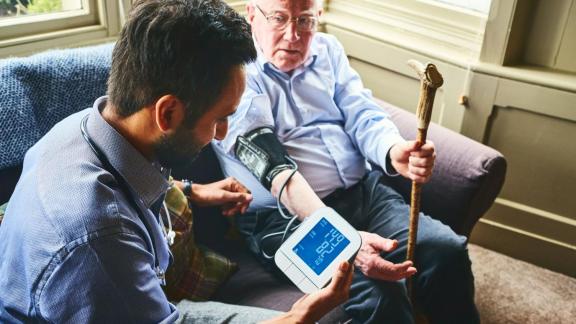Supporting early discharge from hospital through a trust-led virtual ward: Central London Community Healthcare NHS Trust

Overview
The Wandsworth and Merton hospital at home team at Central London Community Healthcare NHS Trust (CLCH), set up one of the first community trust-led virtual wards in the country, providing hospital-level, holistic support for serious conditions, in patients’ homes. CLCH modelling estimates that the initiative has saved approximately 3,478 hospital bed days, helping to reduce urgent and emergency care capacity pressures in the local system by improving patient discharge rates or avoiding admission altogether.
What the organisation faced
The national challenges of the elective care backlog, difficulties with discharging patients and winter pressures all have health implications for elderly/frail patients. Patients remaining in hospital beds for prolonged periods of time often lose muscle tone and fitness and can have an increased risk of falling, sleep deprivation, catching infection and mental deconditioning. These conditions can create adverse health outcomes for elderly patients and increase complexity. In an initial bid to support early discharge services and provide a safe alternative to inpatient care, the Wandsworth and Merton Hospital at Home team set up one of the first community trust-led virtual wards in the country.
Improvement
In the community-led virtual ward, a team of doctors, nurses and pharmacists work together to make sure patients are managed by the right person, in the right place at the right time to provide intensive hospital-level, holistic support for serious conditions, in patients’ homes.
This means that patients can be discharged early from hospital or avoid going in for potentially lengthy stays altogether, instead enabling them to remain at home and receive a high quality of care in familiar surroundings. Should the patient begin to feel unwell, the service has systems in place to assess and quickly alert a clinician, reducing the possibility of an emergency re-admission.
Since its inception, the hospital at home team has also developed additional skills to enable delivery of digital-centred care such as virtual assessments, heart rhythm testing and remote monitoring. The team has also expanded to include a physiotherapist and occupational therapist, so that more patients can benefit from support at home.
Outcome
Since launching in December 2021, more than 552 frailty patients have been directly accepted by the team from both the hospital and the community.
Two-thirds (66 per cent) of the patients that have been seen are classified as severely frail, with 88 per cent of patients having four or more chronic conditions, including heart failure, COPD, asthma, and pneumonia. Providing care at home for these patients allows them the hospital-level care they need, safely and conveniently, and to be closer to their support networks.
Being treated at home, in a familiar environment, close to their network of support, allows them to recover quicker and eliminates hospital-acquired infections. In addition to providing better quality services for elderly patients, CLCH modelling estimates that the initiative has been estimated to have saved 3, 478 hospital bed days, helping to reduce urgent and emergency care capacity pressures by improving patient discharge rates or even avoid admission altogether.
Lessons learned
“This innovative way of working means that we are able to support more patients to get better in their own homes, optimising their wellbeing and helping them to avoid unnecessary and lengthy admissions to hospital, which can have a detrimental impact on their health.” Dr John Rochford, divisional medical director at Central London Community Healthcare NHS Trust.
“People have been shown to get better faster when in the place they call home, rather than if they’d stayed in hospital – sleeping in their own bed with their families and friends around them. It also helps support our local hospitals as people are supported to go home earlier or avoid going in altogether. This is a great example of partnership working between the Hospital at Home team, St George’s NHS Trust, GPs, and specialists in the community for the benefit of our patients.” Mark Creelman, locality executive director for Merton and Wandsworth at NHS Southwest London.
Contact details and further information
To connect with the creators of this service, contact Central London Community Healthcare’s communication team at clch.communications@nhs.net.
Further information is available on the trust’s website


